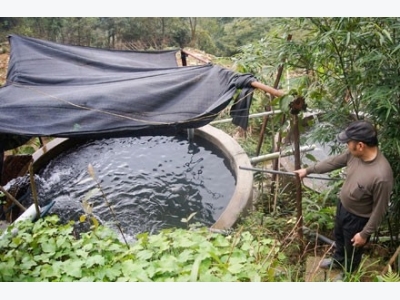Cold-water fish a gold mine

Hoàng Văn Tạ now earns up to US$220,000 a year from his salmon farm.—Photo laodong
HÀ NỘI – Hoàng Văn Tạ, 53, was the first person to farm salmon in his commune in the mountainous province of Lạng Sơn in 2007. Now he earns as much as VNĐ4-5 billion (US$180,000-$220,000) a year from salmon.
Mẫu Sơn Commune, Lộc Bình District is located about 170km northeast of Hà Nội, with the highest peak reaching about 1,600 metres above sea level. The area is a famous tourism site for its spectacular landscape, its tea from tea buds plucked from the mountain’s vast tea fields, and now, for its delicious salmon, as well.
In 2007, when Tạ traveled to Sa Pa District and had a chance to visit a salmon farm there, he thought of building the same farm in Mẫu Sơn Commune, where the weather conditions are similar.
He invested VNĐ1 billion (US$44,000) in building artificial pools, pumping machines, and salmon breeding. But the beginning was hard. Tạ had to travel back and forth from Mẫu Sơn to Sapa for seven months to learn from the experience of veteran salmon farm owners. “Breeding salmon is like baby-sitting. It doesn’t mean success even if you’ve learned by heart all the theories,” Tạ said.
Initially, his salmon died after a short time. “Salmon can only survive in clean water and in temperatures from 5-17oC, anything above which they die. They also need a high supply of oxygen in water,” Tạ said, adding that it was a hard job.
At the beginning, Tạ let rain water run directly through the salmon pools, but found that leaves and other components in the rainwater killed the fish. After a while, Tạ got adopted other techniques and things improved.
“Salmon are easily caught fungus in polluted water. So in the rainy season, when the water is mixed with leaves and other kind of waste, I have to stay by the pools the whole day and night to filter the water from the stream, or else the fish would all die,” he said.
Tạ also had to use lots of salt to help the fish stay clean. “Sometimes I have to buy a tonne of salt a month. Summer is the most difficult time because fish often get bacterial contamination from stream water,” he smiled.
Starting with 800, Tạ now has 2,000 salmon each year.
Previously, Tạ could only harvest salmon once a year, but currently thanks to modern technology, he can do so twice a year. A mature fish weighing between 1.5kg and 2kg brings in up to VNĐ500,000 ($22) per kilogram.
Tạ has been co-operating with another resident in his commune, Triệu Văn Trình, to expand the farm model. Trình now has 10 salmon pools with over 3,000 fish.
Ninh Văn Xa, deputy head of the Mẫu Sơn Tourism Management Board, said Ta’s salmon farming model was the first of its kind in the area and opens up many opportunities for local residents.
Salmon and sturgeon were first raised in Sa Pa District, Lào Cai Province, in 2005. After 10 years, cold-water fish farming has thrived in Sa Pa, with a total output of 265 tonnes in 2015.
The Research Institute for Aquaculture No 1 is the country’s first cold-water hatchery and is currently home to nearly 30,000 salmon, including 17,000 mature fish raised from eggs. Each year the centre provides 50-60 thousand salmon roe to the local market
Có thể bạn quan tâm
 Fish sauce – the spirit of Vietnamese cuisine
Fish sauce – the spirit of Vietnamese cuisine Vietnam has fish sauce which is the most well-known Vietnamese condiment and popular across Southeast Asian countries.
 Japanese eels: Progress in breeding and nutrition
Japanese eels: Progress in breeding and nutrition An overview of micronutrient requirements of broodstock and juveniles. The Japanese eel (Anguilla japonica) is an important and valuable food fish in East Asia
 Shrimp aids climate change fight
Shrimp aids climate change fight Rising sea levels have exacerbated saline intrusion and coastal erosion in Việt Nam, but farmers can make the best out of a bad situation